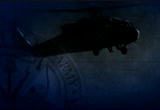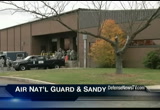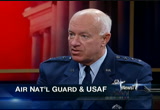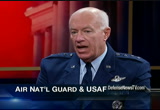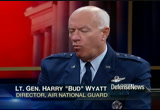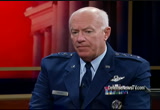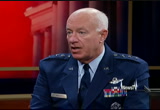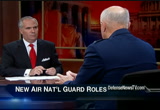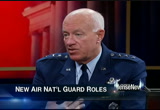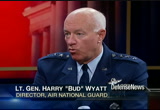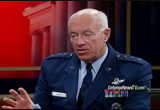tv This Week in Defense CBS November 4, 2012 8:00am-8:30am EST
8:00 am
welcome to "this week in defense news," i'm vago muradian. what do countries across asia think of an increasingly assertive china and america's renewed focus on the region? we talk to defense news' own bureau chief for some answers. but first the national guard plays a critical role in america's national security. at home, supporting disaster relief operations as in the wake of superstorm sandy that devastated parking lots of the northeast -- parts of the northeaster operations worldwide including afghanistan. while the guard is part of the air force, units -- units in each state are under the command of governors and so the guards relationship with the active duty force can sometimes be strained. that's been the case since february when the air force said that of 9,900 proposed personnel cuts, 5100 would come from the guard. a move that sparked a fire storm of protests on capitol
8:01 am
hill. lawmakers governors and guard leaders accused the air force of failing to coordinate cuts they say fell disproportionately on citizen airmen and in protest the congress prohibited the air force from executing $9 billion in cuts freezing the services ability to shed personnel to meet targets for the budget. the new chief of staff general mark welsh on the show a few weeks ago said that one of his top priorities is to improve the relationship and regain control of his budget. joining us today to talk about the state of the relationship and the future is the director of the air national guard, lieutenant general "bud" wyatt. sir, welcome to the program. >> thanks, great to be here. >> so let's first start off with superstorm sandy. obviously as in any disastrous situation, the guard and the air ford are in the forefront. what are you doing now? >> the first thing that people think about is person recovery especially in the early stages. we have some helicopters and lift available should the
8:02 am
governors need it. we provide that capability and security forces, medical forces, communications are very important with an event like this, the this is coordinated through the air force department of defense. >> this is pace of operation that you can sustain for a fair period of time. >> i mean this is big operation but it is not as big as katrina. and the governors obviously are in charge in their particular jurisdictions, we work through the general who our guards men either army or air in each state, if a particular state's capabilities that reside in their guard components become overwhelmed usually the governors will then turn to sister states through emergency management assistance come tacts, emax. then if we still don't have enough capability in the guard we will turn using some new authorities to air force reserve command and the active duty to provide the capabilities that either don't
8:03 am
reside in the guard or we become overwhelmed. >> to the budget controversy. they submitted the budget this yore. and it cause -- year. and it did cause a continue verysy. you remember there at the time. what happened from your per spect i have and what are the lessons learned for the long term? >> i don't think the situation was like what a lot of people think it is. we had some discussions inned the air force and i was part of those looking at different ways to provide the capability that the taxpayer expects from the united states' air force and also recognizing we had a shift in strategy and policy. and trying to move the air force forward with a type of capabilities that we wanted but at the same time, being very aware of the budget constraints that we were trying to operate. i wouldn't call it a rift or a disagreement. i would call it just different perspectives of ways to get the job done. we were able to have those conversations inside the united
8:04 am
states air force, but because of the fact that all budget discussions take place behind the pentagon walls if you will, there was not an opportunity to discuss with the governors or with thage assistants general what it was, what changes in fore structure they could live with. to be able to do their state mix that you -- mission that you see is taking place right now with sandy and the federal mission. it's a ballet if you will to figure out what capabilities the country can afford not only for the title x war fight overseas but the governors are in charge of and their mission. >> general welsh said this is top priority to heal the help and move on and pull -- relationship and move on and put this in the past as well as find new ways to work, what are some changes that are going to help improve the strategic relationship going forward? >> first of all i think he's a key person to make that happen. and the outreach that he has done already with the general, with the air national guard,
8:05 am
with the council of governors, has been phenomenal. and i think has set the tone that hey we need to -- we need to rejoin to use his words and promote the business of the united states air force. we can provide the air national guard can provide some things to the united states air force that will be very beneficial as we go ahead. one is the political context that you mentioned in your opening statement. that the guard has with congress. we have a great relationship with congress. primarily because our 89 wings are in all 50 states, guam, puerto rico, virgin islands and the district of columbia and we have those contacts with our governors with our congressional delegations, that we establish and continue to nurture. and so as we go forward trying to figure out what is best for the united states air force, i think you'll see from general welsh, is renewed effort to understand what the title 32 requirements are from the governors and the general and work that into the fore structure as we go ahead and
8:06 am
make tough decisions on exactly what is the right active component reserve component mix. >> but this is a time of budget cutting on ultimately, one of the thing that is the chief is talking about is bringing governors' requirements into the big air force planning process. how exactly is that going to work? >> a couple of different processes. one is at the air force level, will be primarily directed to thed a jew substantiates general who answer direct toy to the governors. we're going to be able during the next budgeting session i think to more freely discuss proposed changes to air force fore structure and the acrc mixed part of that. >> the activity component reserve component. >> yes, sir. as we go forward. this will help with the dialogue and i think everyone understands that you know, that the governors don't want to write the president's budget for the military. they have their own challenges with their state budgets. but they do i think want to know if there are some proposed
8:07 am
changes to air force fore structure specifically air national guard in their states. how old would that affect their ability to respond to some of these domestic operations situations. >> but some of this also is prestige. and at the end of day you still have to make cuts, what's the best way to do this to reconcile the force with the available resources? >> they're going to have to be some cuts i think across the board. the key is making sure that we do consider the title 32 fight. and the capabilities that the governors need. and if there's a way to mix that between the cuts that the guard will be required to take and that the active duty is required to take, i think we'll come out with a better total product in the end. it's a -- there's now the council of governors that was i think a matter of national defense authorization act of 2008, president obama has
8:08 am
appointed the governors. that has opened up a line of communications from ten key governors to -- directly to the secretary of defense. that communication channel is being used and then the air force channel of communication through the chief of the national guard bureau already used a -- will be used also to exchange ideas on the cuts. >> in terms of the freeze in terms of personnel reductions how is that hitting you guys for the time being? >> freeze basically leaves our fy 12 fore structure in place. and so it's added a little bit of stability as we work through hopefully a compromise with the united states air force on a way ahead. you know where we are in the budget cycle right now, that would be for physical year '13 and probably '14 as we go forward. because we're going to be putting '15 together in just the next few months. >> do you have any solution in the offing anytime soon? >> we're getting close and there have been considerable compromises made by the united states air force, i think that you know they're going to
8:09 am
recognize that -- beginning to recognize there's such a thing as a perfect budget and then one that is executable. to borrow the words from the chief of staff. and i think that we're getting pretty close to one that will be executable. we hope to be able to get clearance from the secretary of the air force and secretary panetta to go forward with that here in the near future. but you know, whether that will satisfy the members of congress is yet another question to be answered. >> stay tuned for more with general "bud" wyatt director of
8:10 am
alright everybody, get your heads up. now when i was in the military, i learned that if you stand together, you can stand up to anything! no matter where i was deployed, i always knew that somebody had my back! you boys are your own band of brothers! you have each other! just like i had navy federal credit union... 24/7... live customer support! let's go! let's go! 4 million members. 4 million stories. navy federal credit union. we're back with lieutenant general "bud" wyatt the
8:11 am
director of the air national guard. the sir, the personnel question we were talking about at the end of the last segment. so referablively, i know no the -- effectively. the active due forces are going to take bigger cuts to spare cuts from the guard. is that -- is that a good way of understanding it? >> i think you're close if i go what i meant to say was that actual numbers-wise which you have to remember is the air guard is about one-third the size of the active component and one of the complaints that we saw out of congress was that the personnel cuts were not proportional. i think numbers-wise what you'll see is we come together is maybe more active duty members being cut. fewer air guards men being cut. but the percentages of cut will be more in line -- they'll be more proportional than they were. >> after every conflict missions are swapped among what is really a total force. i mean despite the hiccup we saw earlier. the active duty air force the reserve and the guard are really a total force. you go the units around and
8:12 am
world and you can't tell who's who. but right now there's a shift in the kind of missions and roles are being swapped. guard is taking over the mc 12 surveillance aircraft for example. wanting to play a bigger roll in unmanned systems. as well as pick up an intel processing role. what are some of the missions that are going to be going into the guard and what are some of the missions that are going to be shed from the guard? >> the first one and i think maybe the most important mission is the cyber mission. when you think about the skill and expertise that already exists in the air national guard, that primarily because 70% of our folks work for civilian companies i a lot of them in the computer. i. t. industry. we already have some great cyber warriors that we need to capitalize on that relationship. keep them in the air guard. capture some of those active duty folks that decide to transfer off of active duty and take some of the high paying cyber jobs. so i think the cyber world
8:13 am
offers great opportunities for the air national guard. when we get into some of the more traditional missions, what we -- what we try to stay away from are the ones that are constantly high operational tempo although we want to stay involved in some of those because the goal is to participate in all the missions of the united states air force but the percentage of our portfolio we might put into high operations tempo mission and that equipment will be less than one that we can plan for, predict, and roll our forces in on a continuing basis going forward. things like -- you know, some of the fighter presence overseas might be something that where we leverage the expertise of the air force, our guys and gals are trained at the same standard at the air force. i'm an example. i have ten years of experience and 31 years in the guards. we leverage that experience. you know fly the same equipment. but the balance between high operations tempo and maybe those platforms that we would
8:14 am
use in a strategic fight will have to take a look at how we mix active component and reserve component. >> but there are some people that say given the demand on uabs for example and mc 12s and how important they were in iraq and afghanistan, these were the wrong kinds of aircraft. it should be more transports and tankers and things you traditionally held. >> one thing to remember with manned or unmanned isr is that you know we're not always going to be forward deployed to the degree that we are right now. and you mobile there are some limitations with what you can do with that capabilities in the continental united states, if we want to talk about sandy for example, it would be wonderful to be able to employ some manned isr to take a look at infrastructure, flooding levels, and take a look at some of the situational asituation that our governors in the present needs to see. so that capability even though right now it's deployed a lot. there is a use for the guard in a home state. >> the -- the air force reserve
8:15 am
and you mentioned earlier and the active duty force are going to be playing a larger disaster relief role. historically they have prevented that. how is that new relationship going to work in which you will have active duty units participating in relief operations? >> there are capabilities that reside in the active component and the air force reserve command. that not talking about law enforcement, or anything that would be related to law enforcement. there are still some capabilities that if we get short in a situation where the guard can't provide it, we would need of the access to either the air force reserve or the active component. there have been spleuchans in the law that allows the air force -- some changes in the law that allows the air force commands to be accessed by the governor. the governor is still in charge in his or her state. but they can make the request. the they can access guardian by requesting them because they are always chop 2 or part of
8:16 am
governor's force. in the homeland though, accessing the active component and the air force reserve command is a little bit different. the governor is still in charge but would go through the department of defense to request a particular capability. that force would be then chopped to the governor and they would have a dual status commander that has been trained and the command for both. >> sir, thank you for joining us. we appreciate it. next, washington sees china as a ri
8:19 am
over the past decade china has been improving its mill care capabilities -- military capabilities bullying its neighbors into making concessions. hardly a week goes by without some incident over disputed islands claimed byline and its neighbors. -- by china and its neighbors. meanwhile washington has been moving to bolster alicenses with japan, south korea and australia. what's the region's view of beijing and how is washington's renewed focus on asia being received? here with answers is our very own man in asia wendell minnick in town for his annual visit to washington from taipei. welcome wendell. >> thank you. >> so how is china and specifically its military modernization viewed in the region including china's fielding of a new aircraft
8:20 am
carrier? >> well, each country has a different perspective oncoming's military modernization. the philippine is the most concerned about it obviously. they have a very weak navy. both of them have claims to the south china sea and these disputes are flaring up of course. china's military modernization efforts include an aircraft carrier and they appear to be building more as we speak. so they're laying claim to south china sea and other parts of the east china sea as well. primarily for oil and fishing rights. china's a growing population, it's a hungry nation, they're flush with cash. and they spend it on big ships. and they want to enforce their territorial claims. >> part of it is bullying by china. to get its neighbors to yield. but there's a sense that china won't ever really resort to force. is that the same sense that
8:21 am
people in the rejohn have? >> i don't think so that -- region have? >> i don't think that -- i believe that china wants to win without fighting, that's sort of an ancient chinese saying. >> it's from sun t u actually. >> they seem to become very aggressive all at the same time. whether that's actually under beijing's thumb opt. it's not clear what they're doing. but they're using these sort of initiatives to drive a wedge between the different nations particularly over fishing rights. they push into the eezs and no one -- >> the exclusive economic zones. >> right. and vietnam is pushing back a little bit. the philippines is having trouble with that. they don't have a very modern navy. >> japan is also pushing back. >> exactly. it has really freaked out the japanese. not only the chinese claiming
8:22 am
the islands but taiwan claims them as well. >> china effectively shut down japanese factories in china and every one of the companies are economically dependent on china. what leverage do countries have over china ultimately? >> not much. japan is very dependent on exports as well as taiwan and taiwan has helped build up the chinese economy. they have fangries and businesses in china -- factories and business in china. >> i think naturally some of the leading industrialists in chinese are taiwanese. >> many in taiwan are very proud of the chinese roots can they're proud of china's military modernization efforts. it has a you know, a negative side to it of course. china is aiming about 1300 short range ballistic missiles at taiwan. and despite better relations over the past four years. >> it's a -- it's a tense piece. let me ask you about
8:23 am
washington's refocus on asia, how is that being received in the region by the countries? >> the chinese are obviously unhappy about this sort of talk. the koreans you don't hear much about it from the koreans. we have been reducing force levels there. there have been problems in okinawa. protests against our base and the troops there. we have been moving some folks around. we want to -- it appears we want to go into the philippines again. i don't know how much of a force we want to put in there. but depending on the philippine people who kicked usous originally back -- us out originally back in the early '80s and vietnam is a difficult card to play because you know there was a war. we did kill you know over a million vietnamese during the war and that hasn't been forgotten obviously and in singapore we have a rotation normal force there with the navy. it's -- >> so would it be fair to say that it's become with you the -- it's welcome but it's all in
8:24 am
the details of the strategic relationship? >> sure, these country have grown up in the past 20, 30 years. they're no longer dependent on the united states. taiwan is has grown up and it has a modern military force. they're not so dependent on american military might as they were 20, 30, 40 years ago. >>
8:26 am
have demanded either direct or indirect industrial compensation in return for defense purchases that are called "offsets." some governments want their domestic industry to build and support the weapons that will serve under their flag. others want economic development -- paper mills, fish farms, tourist projects, and, increasingly, investment in the training, education and health sectors. to defense contractors, offsets are a necessary evil in a competitive international market. but many now demand their economies receive 70% or more of the value of a given contract, worrying executives who fear they may not be able to deliver on all those accumulated promises -- projected to top $500 billion by 2017, 60% shouldered by american firms. e right to worry. some of these schemes have proven costly failures. companies and governments bear blame: governments for making increasingly unrealistic demands and industry for agreeing to them. needed are global offset rules to establish precisely what constitutes acceptable or unreasonable industrial-compensation packages.
8:27 am
but, in this buyers' market, companies are unwilling to trust their competitors to follow the rules. given the stakes they must strike smarter deals with help to mitigate long-term risks. renegotiating to ease mutually unreasonable demands to mitigate losses. this much is clear: a new approach is vital if contractors are to avoid being strangled financially by contracts first hailed as major victories. thank you for joining us for "this week in defense news." i'm vago muradian. before we go i'd like to wish the united states marine corps a very happy
8:29 am
rain drain politics. why the u.s. is willing to tick out "-- kick out biosign tipses after years of education. i'm -- bioscientists after years of education. i'm steve usdin. welcome to "biocentury this week." from alexander hamilton to alexander graham bell, american innovation has been fueled by immigrants. icons of modern american innovation, companies like google. intel and e-bay were founded by men and women who were born outside the u.s. some of the most successful life sciences companies, pfizer, merck were founded by immigrants. and america continues to lead the world in biotechnology driven by scientists and executives from around the world. now this pipeline of innovators is being choked by immigration policies that force many foreign born graduates of u.s. universities to leave after completing years of
134 Views
IN COLLECTIONS
WUSA (CBS) Television Archive
Television Archive  Television Archive News Search Service
Television Archive News Search Service 
Uploaded by TV Archive on

 Live Music Archive
Live Music Archive Librivox Free Audio
Librivox Free Audio Metropolitan Museum
Metropolitan Museum Cleveland Museum of Art
Cleveland Museum of Art Internet Arcade
Internet Arcade Console Living Room
Console Living Room Books to Borrow
Books to Borrow Open Library
Open Library TV News
TV News Understanding 9/11
Understanding 9/11